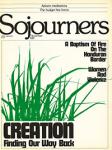I saw what looked like a carnival--a lot of stands like we see at the religious education conventions where the salespeople are selling books; the only difference was they were selling weapons instead of religious articles." Fr. John Mudd, pastor of Saints Paul and Augustine Catholic parish in Washington, D.C., was talking about his visit to the U.S. Army's "arms bazaar" at the Sheraton-Washington Hotel in 1978. Since that time, the various weapons expositions at the hotel have been restricted to Army, Navy, or Air Force Association members and U.S. and foreign military and government leaders, the associations' specially invited guests.
Over the last three years, the Campaign to Stop the Arms Bazaar, a coalition of religious groups and local churches, has prayed, leafletted, held silent candlelight vigils, and been arrested outside the Sheraton-Washington Hotel during the annual Air Force Association's (AFA) arms bazaar. According to Dana Mills Powell, who works full time with the Sojourners Peace Ministry and coordinates the Campaign to Stop the Arms Bazaar, the AFA's weapons show was singled out from the other arms bazaars "because of the nuclear threat, which is so much more a part of the Air Force than the Army."
And the nuclear threat was certainly visible in the exhibit hall.
Journalist Howard Moreland, an Air Force veteran, was able to join the AFA for a mere $13. Thus, he just walked into the arms bazaar this year: "The most dramatic thing I saw was a full-size mockup of an M-X missile nosecone, complete with 10 nuclear warheads. It was huge. It went all the way up to the ceiling," Moreland explained. "The only reason they didn't have actual weapons in there is because the Air Force weapons are too big to fit in the hall. If they could fit them in, they'd be in there. There were certainly a lot of full-size mockups."
The huge "briefing and display" area contained a wide assortment of video tapes and films, some actually showing the aerospace industry's latest weapons in action. Planes and missiles flew; helicopters hovered; radar located and "locked onto" a target, but firepower itself was rarely shown. Death and destruction were never a part of the exhibit. Colonels, generals, politicians, and diplomats don't have to be told where it all leads.
"Bread not Bombs" was the message of this year's witness against the nuclear arms bazaar, held September 13 to 17. Each year the witness has more and more participants. Each year they vow they'll return until the weapons exposition is shut down. There is a special patience about them; they know that the Spirit moves slowly. Or are their expectations unreal?
In recent years, similar arms bazaars have been shut down, due to local citizens' pressure, in Rosemont, Illinois, and Anaheim, California. And when the weapons dealers retreated to West Germany to sell their wares, protestors there convinced them they should not return next year. "I get so much hope when I hear about other campaigns around the country," says Powell. "I hope that hearing about this, people in other parts of the country are given hope--indeed something is happening!"
A certain spirit seemed quietly and invisibly present within the witnessing community outside the hotel all week, from the religious service and rally on Sunday, through the civil disobedience Wednesday evening, to Thursday's unobtrusive final leafletting. It seemed a foolish thing, in the face of the huge weapons industries promoting their devices of death.
Yet those who seemed foolish remained all week--these folks who came to be known as "the demonstrators." For fools, the spirit is hope. It electrified the air, and made peace actually seem possible. During the time of the witness, 12 nuclear bombs were built and added to U.S. stockpiles. But hope did not waver a bit.
On Wednesday evening, the "fools" offered bread to the keepers of the bombs. The bread was rejected, and those carrying it sat or knelt down in their tracks, which also happened to be the main driveway to the hotel. Many people in dress uniforms and formal evening clothes sat idly in their big cars, waiting. There was a dinner dance to attend.
While those inside the hotel danced, 51 of those outside were arrested. Most of them appeared in court the next day and were sentenced to fines or community service and supervised probation; but those whom the judge discovered had participated in previous civil disobedience received jail sentences. These included Frank Branchini of the Washington Friends Meeting, and Robin Jernigan, David King, Joyce Hollyday, Dana Mills Powell, and Ed Spivey Jr., all of Sojourners. They received 15 days. Jim Wallis and Danny Collum, also of Sojourners, each received a 30-day sentence.
Thursday, the 17th of September, 1981. The weapons profiteers are loading their deadly machines into huge trucks. Another arms bazaar has done its job on the minds of the willing buyers. Three more nuclear weapons are being built on this day. The last few protestors, the people of hope, are leaving. On the. ground is a remnant of their daily witness to life in the face of death, a flyer: "Bread not Bombs." A small group of children hurries along the sidewalk, noisily. There is a reason to live, to believe. The Campaign to Stop the Arms Bazaar is already preparing for next year.
Hope has not wavered a bit.
John Swinglish and his wife, Mimi, lived and worked at Emmaus House, a peace and justice center in Washington, D. C. when this article appeared.

Got something to say about what you're reading? We value your feedback!
